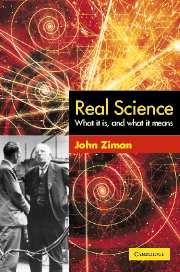
-
Select format
-
- Publisher:
- Cambridge University Press
- Publication date:
- 24 August 2009
- 27 April 2000
- ISBN:
- 9780511541391
- 9780521772297
- 9780521893107
- Dimensions:
- (228 x 152 mm)
- Weight & Pages:
- 0.804kg, 412 Pages
- Dimensions:
- (228 x 152 mm)
- Weight & Pages:
- 0.82kg, 412 Pages
- Subjects:
- Philosophy of Science, Popular Science, Philosophy, General Science
You may already have access via personal or institutional login- Subjects:
- Philosophy of Science, Popular Science, Philosophy, General Science
Book description
Scientists and 'anti-scientists' alike need a more realistic image of science. The traditional mode of research, academic science, is not just a 'method': it is a distinctive culture, whose members win esteem and employment by making public their findings. Fierce competition for credibility is strictly regulated by established practices such as peer review. Highly specialized international communities of independent experts form spontaneously and generate the type of knowledge we call 'scientific' - systematic, theoretical, empirically-tested, quantitative, and so on. Ziman shows that these familiar 'philosophical' features of scientific knowledge are inseparable from the ordinary cognitive capabilities and peculiar social relationships of its producers. This wide-angled close-up of the natural and human sciences recognizes their unique value, whilst revealing the limits of their rationality, reliability, and universal applicability. It also shows how, for better or worse, the new 'post-academic' research culture of teamwork, accountability, etc. is changing these supposedly eternal philosophical characteristics.
Reviews
‘… an excellent insight into the social and ‘political’ structure of the scientific world. Real Science makes interesting reading because it shows that scientific knowledge, rather than providing the idealized, clear and concise description of the world around us, is all too much an evolving product of the human mind.’
Peter L. Hordijk and Eloise C. Anthony Source: Nature Cell Biology
‘Any scientist interested in establishing a more constructive dialogue with the science and technology studies community would be well-advised to read these works.’
Source: Physics Today
‘… for anyone wanting a detailed, realistic, well-rounded view of science, Ziman’s Real Science is your book.’
David L. Hull Source: Nature
‘… a well-organised, carefully argued and very readable work.’
Uwe Schimank Source: Research Policy
‘Ziman presents such an impeccably-assembled analysis of what exactly science was, is, and is becoming, that reading it brings about that satisfying sense of a mental jigsaw falling into place.’
Vanessa Spedding Source: Science and Public Affairs
'I would strongly recommend this book …'.
Source: Scientists for Global Responsibility
Contents
Metrics
Altmetric attention score
Full text views
Full text views help Loading metrics...
Loading metrics...
* Views captured on Cambridge Core between #date#. This data will be updated every 24 hours.
Usage data cannot currently be displayed.
Accessibility standard: Unknown
Why this information is here
This section outlines the accessibility features of this content - including support for screen readers, full keyboard navigation and high-contrast display options. This may not be relevant for you.
Accessibility Information
Accessibility compliance for the PDF of this book is currently unknown and may be updated in the future.


